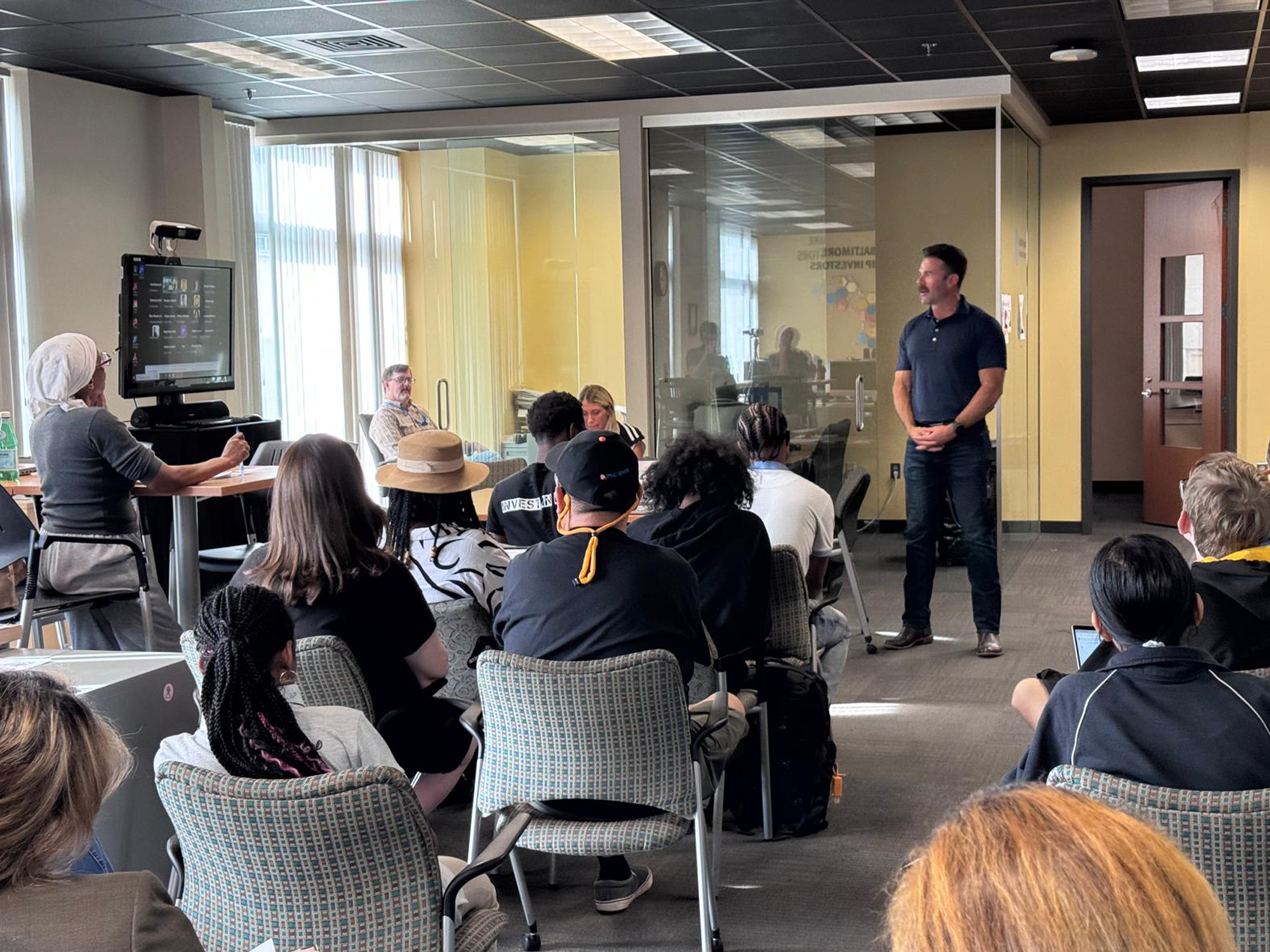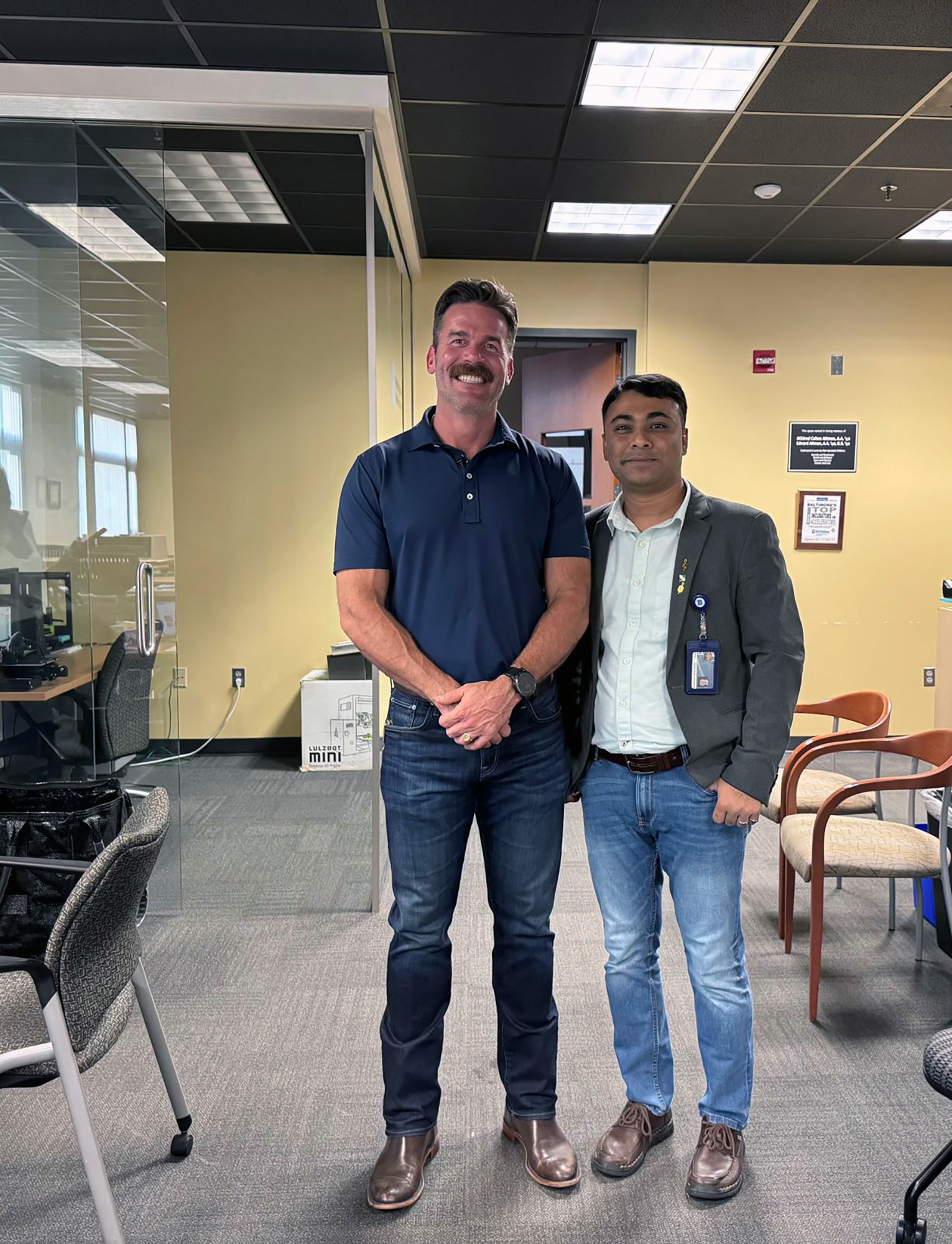
This post was written by Sheik Akij, MBA student and graduate assistant for Center for Entrepreneurship and Innovation at University of Baltimore.
The University of Baltimore’s Center for Entrepreneurship and Innovation (CEI) transformed recently into a hub of energy and inspiration as students, alumni, and community members gathered both in person and online for the latest ThinkUBator Workshop: From Idea to Income – Entrepreneurial Blueprint.
The guest of honor was Gregory Vetter, a serial entrepreneur best known for turning his mother’s homemade salad dressing into Tessemae’s All Natural, the nation’s top organic brand and a $300 million enterprise. What captivated the audience wasn’t the scale of his success, but rather was the raw honesty with which he shared his setbacks, lessons and the resilience that carried him through.
Vetter grew up in Annapolis, the son of a nonprofit worker and a stay-at-home mom. After college, he landed in a sales job, cold-calling from an office above a bodega with a cemetery view. Hungry for ownership, he once asked his boss about partnership, only to be told it would never happen. That blunt answer left him restless, searching for something of his own.
From Idea to Entrepreneur of the Year
One day, Vetter discovered that a friend had used his door code to break in and steal a bottle of his mom’s salad dressing. Shock quickly turned to laughter. What kind of dressing is so good that someone would break into my house to steal it? That moment sparked an idea. He told his wife he was quitting his job to launch a salad dressing company. Her immediate response: “I have a weird feeling this is going to work.”
With only cold-calling skills to rely on, Vetter began phoning grocery buyers, introducing himself as a “world-famous food manufacturer” long before he had a label or a bottle. Dozens rejected him. Then one buyer agreed to a meeting at noon. Vetter showed up with a container of romaine lettuce topped with his mom’s dressing. The store manager took a bite and declared: “That’s the greatest salad dressing I’ve ever had.” Four cases were ordered for the store’s grand opening on May 5, 2009.
Momentum built quickly. He and his brothers bottled at night in the back of a rib joint, delivered during the day, and spent weekends handing out samples. He grew his footprint across the East Coast. National media took notice, awards followed, and Vetter found himself named Entrepreneur of the Year. Yet he remembers one of those moments with humility: “I was standing in a parking lot, covered in olive oil, my feet aching, and I thought, so this is what success feels like.”
Students enjoyed the opportunity to ask Vetter about scaling startups, balancing products and services and building credibility. His advice was sharp yet relatable: create a “flagship success story” to prove value, ask yourself “Why should anyone care?” before launching, and “start with the end in mind,” mapping daily steps to long-term goals. On leadership, he offered a vivid reminder: “You have to stand above the beach ball and see all the colors.”
Vetter closed with a quote that lingered long after the session ended: “The cave you fear to enter holds the treasure you seek.” His story showed that entrepreneurship isn’t about avoiding fear—it’s about walking straight through it.
Advice Worth Remembering

As a graduate student and aspiring entrepreneur, I found Vetter’s reflections on resilience especially meaningful. His openness reminded me that setbacks are not roadblocks but stepping stones, and that the courage to keep moving is often more valuable than the win itself.
Other students in attendance were also impressed with Vetter’s experiences.
“As an early-stage founder in the consumer packaged goods space, I found Greg’s insights extremely valuable for navigating such a complex industry,” said Joyson Balisamore, an MBA student, founder of Jay’s Watermelonade, and past winner of CEI’s Rise to the Challenge pitch competition. “His talk emphasized the importance of making sure there’s a real market for your product, using failure as a trampoline for success, and staying connected with the right people, partners, and suppliers. Events like this at CEI UBalt give me the chance to learn directly from experienced founders and apply those lessons to my own entrepreneurial journey.”
Dong Soh, B.S. in Simulation and Game Design student, soaked in lessons he hopes to one day apply to his own company.
“The biggest lesson I took away is that we shouldn’t see big goals as impossible—ambition should be the compass,” he said. “For me, that means dreaming of building a game company that could one day rival Nintendo, but starting small with text adventures and simple games. Success is about stacking small wins until they become something bigger. That’s why CEI at UBalt bringing in speakers like Greg matters so much—he shows us that ideas are important, but execution is what truly makes the difference.”

